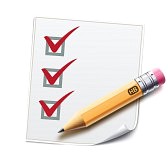How to Fill in Job Application Form
Online job application forms are becoming increasingly popular means to gather relevant data about candidate’s abilities to assess applicant's suitability for the job early on in the recruitment process. Below, we will review some of the most common sections of job application form and provide you with hints and tips on how to answer each section to maximise your chances of success. Good luck!
 |
Personal details in job application form
This section collects your personal data such as your name, address, phone number, e-mail address and any other relevant information employer may need in order to make sure that you meet the basic employment requirements such as entitlement to work in particular country, driving licence etc. Often, details provided on job application form are protected by data protection act where employer hold direct responsibility for confidentiality of disclosed data.
Secondary and further education
This part of job application form requires you to list all of your qualifications usually with subject and grade of examinations. Secondary or further educational attainments may refer to GCSE’s/ A/ AS Levels/ Scottish Higher/ Irish Leaving/ Access/ GNVQ/Baccalaureate etc. Listing your secondary or further qualifications in your job application form will help the employer get to know your background and skills you may have developed at earlier in your life.
Higher education
This section is particularly important as it indicates prospective employer your interest in particular field and your early career motivations. When completing higher education section of your job application form list all degrees/ diplomas or professional qualifications that you hold or that you currently study for, whether at undergraduate or postgraduate level. Remember, higher education section not only indicates prospective employer that you have interest or relevant skills in particular field but also shows consistency of your efforts to achieve your career goals and aspirations.
Skills
This section of online application forms usually refers to hard (technical) skills rather than soft skills. Often you will be required to list any languages that you can speak and rate level of your proficiency for example basic, intermediate, fluent or mother tongue. Additionally, you may be asked to specify and expand upon your computer or IT skills. Depending on job or role you apply some skills may be more relevant than the others.
Employment and work experience in job application
Employment and work experience section is one of the most important sections of your job application form. You will be required to briefly describe any work you have undertaken whether paid or unpaid. Often, you will have to provide full details of your previous employer, job title, list your responsibilities and achievements. Remember, employer will form a great deal of opinion about your skills and suitability for the job based on this section. Do not lose heart if you do not have relevant working experience. Remember, we hone skills in every job. For example, if you worked in a bar then it will have given you the chance to develop team working, customer service and time management skills. See more on this topic from our section on how to write work experience in CV.
Competency questions in job application form
This section will provide you with opportunity to evidence and demonstrate specific skills and abilities to your prospective employer. Often, you will be allowed to use examples taken from your education, work experience, placements or voluntary activities. You may be required to demonstrate the skills related to planning, organising, teamwork, problem solving etc... Remember, it is important to use real life examples and describe your achievements in S.T.A.R format, that is, situation, task, action and result. If you are not familiar with S.T.A.R format, then see our section on how to answer competency based questions.

